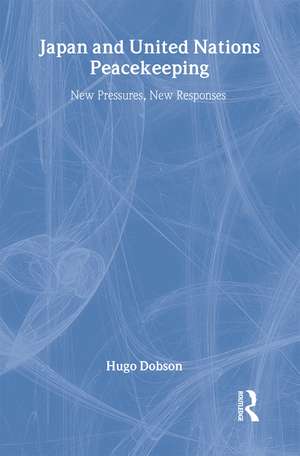Japan and UN Peacekeeping: New Pressures and New Responses: The University of Sheffield/Routledge Japanese Studies Series
Autor Hugo Dobsonen Limba Engleză Hardback – mai 2003
Din seria The University of Sheffield/Routledge Japanese Studies Series
-
 Preț: 411.42 lei
Preț: 411.42 lei -
 Preț: 436.14 lei
Preț: 436.14 lei - 15%
 Preț: 467.44 lei
Preț: 467.44 lei -
 Preț: 412.37 lei
Preț: 412.37 lei -
 Preț: 415.67 lei
Preț: 415.67 lei -
 Preț: 485.84 lei
Preț: 485.84 lei -
 Preț: 458.63 lei
Preț: 458.63 lei - 18%
 Preț: 1109.18 lei
Preț: 1109.18 lei - 18%
 Preț: 1057.75 lei
Preț: 1057.75 lei -
 Preț: 271.05 lei
Preț: 271.05 lei -
 Preț: 410.66 lei
Preț: 410.66 lei -
 Preț: 416.52 lei
Preț: 416.52 lei -
 Preț: 411.64 lei
Preț: 411.64 lei - 17%
 Preț: 172.64 lei
Preț: 172.64 lei - 12%
 Preț: 299.52 lei
Preț: 299.52 lei - 12%
 Preț: 299.52 lei
Preț: 299.52 lei -
 Preț: 292.46 lei
Preț: 292.46 lei - 17%
 Preț: 258.30 lei
Preț: 258.30 lei -
 Preț: 372.58 lei
Preț: 372.58 lei -
 Preț: 322.31 lei
Preț: 322.31 lei -
 Preț: 195.62 lei
Preț: 195.62 lei - 18%
 Preț: 1053.57 lei
Preț: 1053.57 lei -
 Preț: 414.39 lei
Preț: 414.39 lei - 18%
 Preț: 1007.48 lei
Preț: 1007.48 lei - 18%
 Preț: 1326.20 lei
Preț: 1326.20 lei -
 Preț: 416.22 lei
Preț: 416.22 lei -
 Preț: 485.61 lei
Preț: 485.61 lei - 18%
 Preț: 1057.05 lei
Preț: 1057.05 lei -
 Preț: 282.62 lei
Preț: 282.62 lei -
 Preț: 416.22 lei
Preț: 416.22 lei - 18%
 Preț: 1005.80 lei
Preț: 1005.80 lei -
 Preț: 419.50 lei
Preț: 419.50 lei -
 Preț: 487.37 lei
Preț: 487.37 lei
Preț: 764.62 lei
Preț vechi: 1027.66 lei
-26% Nou
Puncte Express: 1147
Preț estimativ în valută:
146.33€ • 151.61$ • 122.12£
146.33€ • 151.61$ • 122.12£
Comandă specială
Livrare economică 28 februarie-14 martie
Doresc să fiu notificat când acest titlu va fi disponibil:
Se trimite...
Preluare comenzi: 021 569.72.76
Specificații
ISBN-13: 9780415263849
ISBN-10: 0415263840
Pagini: 202
Dimensiuni: 156 x 234 x 18 mm
Greutate: 0.48 kg
Ediția:1
Editura: Taylor & Francis
Colecția Routledge
Seria The University of Sheffield/Routledge Japanese Studies Series
Locul publicării:Oxford, United Kingdom
ISBN-10: 0415263840
Pagini: 202
Dimensiuni: 156 x 234 x 18 mm
Greutate: 0.48 kg
Ediția:1
Editura: Taylor & Francis
Colecția Routledge
Seria The University of Sheffield/Routledge Japanese Studies Series
Locul publicării:Oxford, United Kingdom
Public țintă
Postgraduate and UndergraduateNotă biografică
Hugo Dobson is lecturer in the International Relations of Japan in the School of East Asian Studies at the University of Sheffield.
Cuprins
Contents List of figures List of tables List of abbreviations Glossary Acknowledgements Introduction Chapter 1: IR theory and Japan 1.1 Making sense of Japan's foreign policy 1.2 Realism 1.2.i Realism, Japan's foreign policy and peacekeeping 1.3 Liberalism 1.3.i Liberalism, Japan's foreign policy and peacekeeping 1.4 Japan's foreign policy-making processes and peacekeeping 1.5 Constructivism 1.5.i Constructivism, Japan's foreign policy and peacekeeping 1.6 Summary Chapter 2: Norms and Japan 2.1 Introduction 2.2 Norms 2.2.i Existence 2.2.ii Evolution 2.2.iii Strength 2.2.iv Interaction 2.3 Japan and Norms 2.3.i Anti-militarism 2.3.ii US bilateralism 2.3.iii East Asianism 2.3.iv UN internationalism 2.4 Peacekeeping as a norm 2.4.i Specificity 2.4.ii Durability 2.4.iii Concordance 2.5 Summary Chapter 3: The Cold War, 1956 to 1990 3.1 Introduction 3.2 Postwar rehabilitation 3.3 The 1980s 3.4 Summary Chapter 4: The Second Gulf War 4.1 Introduction 4.2 A brief history of the Second Gulf War 4.3 The response of the international community 4.4 Japan's response 4.4.i Anti-militarism 4.4.ii US bilateralism 4.4.iii East Asianism 4.4.iv UN internationalism and peacekeeping 4.5 Summary Chapter 5: Cambodia 5.1 Introduction 5.2 A brief history of the Cambodian conflict 5.3 Japan's contribution 5.3.i Anti-militarism 5.3.ii US bilateralism 5.3.iii East Asianism 5.3.iv UN internationalism and peacekeeping 5.4 Summary Chapter 6: Post-UNTAC operations 6.1 Post-UNTAC 6.2 The changing norm of post-Cold War peacekeeping 6.2.i ONUMOZ 6.2.ii UNDOF 6.2.iii ONUSAL 6.2.iv UNAMIR 6.2.v East Timor 6.2.vi 11 September 2001 6.2.vii The Brahimi Report 6.3 Japan's response 6.3.i Anti-militarism 6.3.ii US bilateralism 6.3.iii East Asianism 6.3.iv UN internationalism and peacekeeping 6.4 Summary Chapter 7: Conclusions 7.1 New pressures, new responses 7.2 The existence and importance of norms 7.3 Measuring norms 7.3.i Specificity 7.3.ii Durability 7.3.iii Concordance 7.4 Summary Bibliography
Descriere
With an approach based on political culture and identity, this book demonstrates the current pressures and shifting priorities that confront Japan's government and people, as they attempt to carve out a new international role.
